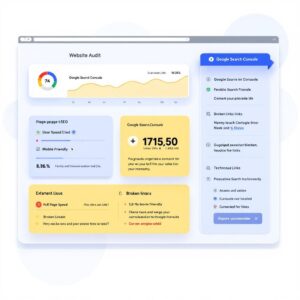The Importance of SEO in E-commerce Success

It’s no secret that the e-commerce landscape is booming, with global online sales exceeding $5 trillion in 2022. However, with thousands of businesses vying for consumer attention, standing out in such a crowded market can feel like a monumental challenge. That’s where Search Engine Optimization (SEO) steps in.
For e-commerce businesses, SEO isn’t just a “nice-to-have” marketing tool; it’s a foundational strategy that drives visibility, traffic, and sales. Whether you’re running a small online store or managing a global e-commerce platform, implementing robust SEO practices is essential for long-term success.
This guide will explore why SEO matters for e-commerce, outline key strategies for optimizing your online store, and highlight actionable steps to boost your website’s search engine rankings. By the end, you’ll have a clear roadmap for turning clicks into conversions.
Understanding the Importance of SEO for E-commerce
What is SEO in E-commerce?
SEO for e-commerce involves optimizing your online store to rank higher in search engine results pages (SERPs) when potential customers search for relevant products. From improving your product descriptions to managing site speed and mobile responsiveness, SEO encompasses a range of practices designed to make your site more “discoverable” and user-friendly.
Unlike paid ads, which provide quick but temporary results, SEO focuses on organic visibility, ensuring that your website attracts customers actively searching for your products.

Why SEO Matters for E-commerce Success
- Organic Traffic is Cost-Effective: While paid ads can help drive traffic, they’re not sustainable long-term for many businesses, especially smaller players in competitive industries. SEO delivers cost-effective, sustained growth by driving organic traffic to your store without additional ad spend.
- Drives Long-Term Growth: When done right, SEO increases your site’s visibility, moving it closer to the top of search results, especially for high-converting keywords like “buy [product] online.” Over time, this steady flow of traffic translates to sales and revenue.
- Improves Credibility: A higher position in Google results signals credibility to users. If your website consistently ranks well, customers are more likely to trust your brand as a reliable source of quality products.
Key SEO Strategies for E-commerce Websites
E-commerce SEO Strategies Overview
To ensure a successful SEO strategy for your e-commerce site, focus on three pillars of optimization:
- On-Page SEO
- Technical SEO
- Off-Page SEO (Link Building)
On-Page SEO for E-commerce
- Optimize Product Pages
Your product pages are your website’s lifeblood, so ensure they’re SEO-friendly. Include relevant keywords in titles, meta descriptions, and image alt tags. For example, if you’re selling wireless earphones, use terms like “best wireless earphones 2024” or “buy Bluetooth earphones online.”
- Use Keywords Strategically
Conduct thorough keyword research to uncover common search phrases. Include primary and secondary keywords but also leverage Latent Semantic Indexing (LSI) keywords, such as “affordable wireless headphones” or “top-rated earphones.” These help you capture a broader audience.

Technical SEO for E-commerce Websites
- Optimize Site Speed
Page speed plays a critical role in how Google ranks websites. Compress images, enable browser caching, and use content delivery networks to ensure your site loads quickly.
- Improve Mobile-Friendliness
With over 60% of online shopping done on mobile devices, having a responsive design that displays correctly on different screen sizes is no longer optional. Google’s mobile-first indexing gives priority to mobile-friendly sites.
- Develop a Clean URL Structure
Use descriptive URLs like “yourstore.com/mens-leather-shoes” instead of “yourstore.com/product123.” Clean URLs are easier to understand for both users and search engines.

Boosting Visibility with E-commerce Site Ranking Factors
Search Engine Ranking Factors
Several factors influence your e-commerce website’s ranking. Key elements include:
- Backlinks – High-quality links to your site signal authority to search engines.
- Relevance – Ensuring your content is aligned with user search intent.
- Site Speed – Slow-loading sites drive users away and lower rankings.
- Mobile Optimization – A website optimized for mobile devices improves both user satisfaction and rankings.
- Engagement Metrics – Pages with low bounce rates and high dwell times (how long a visitor spends on the page) perform better.
How to Optimize These Factors
- Build Links: Partner with relevant bloggers for product reviews or contribute as a guest writer on industry-specific websites to acquire high-quality backlinks.
- Engage Users: Feature user reviews, create interactive FAQs, and incorporate strong CTAs (Calls-to-Action) to increase engagement and reduce bounce rates.
- Focus on Mobile SEO: Regularly perform mobile usability tests and ensure your mobile layout feels intuitive.
The Role of Content Marketing in E-commerce SEO
Content Marketing as a Powerful Tool
Content marketing and SEO go hand in hand. Quality content not only improves your website’s search engine rankings but also keeps visitors engaged and informed.
Content Marketing Ideas
- Blogging and Articles
Create blog posts targeting long-tail keywords, such as “How to Choose the Perfect Running Shoes” or “Top 10 Coffee Makers in 2024.”
- Product Descriptions with Personality
Avoid generic product descriptions. Instead, craft unique, detailed, and optimized descriptions that highlight a product’s features, benefits, and primary use cases.
- User-Generated Content
Encourage your audience to leave reviews or share photos of your products. Authentic content like this builds trust and enhances SEO rankings.
Mobile SEO: Why It’s Essential for E-commerce
Mobile Shopping Trends
Current statistics reveal that mobile devices account for over 70% of global e-commerce traffic. Ignoring mobile SEO not only risks losing sales but also affects your search rankings.
Best Practices for Mobile SEO
- Responsive Design
Ensure your site looks great on all screens, whether it’s a desktop monitor or a smartphone.
- Fast Load Times
Mobile users have limited patience. Tools like Google PageSpeed Insights can help identify issues slowing down your site.
- Seamless Navigation
Create a navigation menu that’s easy to use on smaller screens, enhancing the overall shopping experience.
Using SEO Tools to Monitor & Optimize E-commerce Performance
Essential SEO Tools for E-commerce
- Google Analytics – Tracks organic traffic, bounce rates, and conversions.
- Google Search Console – Identifies crawl errors and monitors keyword performance.
- Ahrefs & SEMrush – Analyze backlinks, competitive strategies, and keyword profiles.
Key Metrics to Track
- Organic Traffic Levels
- Conversion Rates
- Keyword Rankings
- Bounce Rates
By monitoring these metrics, you can identify areas for improvement and fine-tune your SEO campaigns.

SEO is a Long-Term Commitment
SEO is not a one-time task; it’s an ongoing process. Regularly updating your content, performing technical audits, and adapting to algorithm changes are essential for staying competitive.
Remember, ranking higher on search engines translates to more traffic, higher conversions, and success in a crowded marketplace.
Are you ready to elevate your e-commerce game? Start implementing these strategies today or reach out for a tailored SEO audit to see how your online store can thrive.
Frequently Asked Questions (FAQ)
Why is SEO considered an ongoing process?
SEO is constantly evolving due to frequent algorithm updates and changes in user behavior. To maintain or improve your rankings, it’s essential to regularly update your content, analyze performance, and adjust strategies accordingly.
What are technical audits, and why are they important?
A technical audit ensures that your website functions optimally for search engines and users. It identifies issues like broken links, slow loading times, or crawl errors that may hinder your rankings and user experience.
What benefits can higher search engine rankings bring?
Ranking higher can significantly increase your website’s visibility, drive more organic traffic, and boost conversions. This helps your online store succeed in today’s competitive marketplace.
How often should I update my website content for SEO?
Regular updates are recommended, but the frequency can vary depending on your industry and competition. A good rule of thumb is to refresh high-performing content every few months and regularly publish new, relevant content.
Can beginners implement these SEO strategies, or is expert help necessary?
Anyone can start with basic SEO strategies, but advanced tactics, technical audits, and algorithm-specific optimizations often require expertise. Consulting with an SEO professional can help tailor strategies to achieve the best results.





